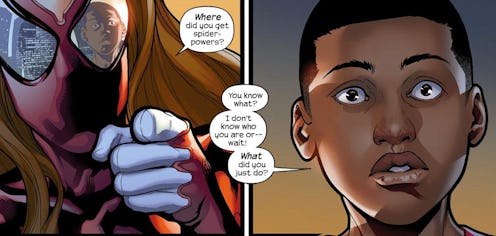Entertainment
'Spider-Man's Producers Need To Cut the Crap

Yesterday we praised Amazing Spider-Man star Andrew Garfield for his statements about how the Spider-Man franchise needs to evolve its social message to more modern times. Today we look at that issue again — this time, though, it's through a deep side-eyeing of Amazing Spider-Man 's producers, whose ideas about Peter Parker don't seem to leave much room for progress.
For those who haven't been following Garfield's every word about Spider-Man, here's the gist: He wants the franchise to use its platform to evolve Spider-Man's heroism to be more relevant to a modern audience. As he once put it in a statement at Comic-Con:
He represents the everyman, but he represents the underdog and those marginalized who come up against great prejudice which I, as a middle-class straight, white man, don’t really understand so much. And when Stan Lee first wrote and created this character, the outcast was the computer nerd, was the science nerd, was the guy that couldn’t get the girl. Those guys now run the world. So how much of an outcast is that version of Peter Parker anymore? That’s my question.
More recently, Garfield said that one good way for Spider-Man to move forward would be to use the character Miles Morales, the Black Hispanic boy who takes over the Spider-Man title after Peter Parker in the comics. The audience gets something more progressive, and the studios get to keep their franchise after Garfield moves on to other things. Money and representation! Everybody wins!
Except Amazing Spider-Man producers Avi Arad and Matt Tolmach pretty much put their foot down and said no way when Indiewire's Drew Taylor asked them about it:
Tolmach: No.
Arad: No. The one thing you cannot do, when you have a phenomena that has stood the test of time, you have to be true to the real character inside – who is Peter Parker? What are the biggest effects on his life? Then you can draw in time, and you can consider today's world in many ways. But to have multiple ones… I don't know if you remember, but Marvel tried it. And it was almost the end of Spider-Man.
Oof. This right here spells out one of the big obstacles in the battle to get comic book adaptations caught up with the times: Studios are terrified. They're making billions of dollars and yet they're still shaking in their boots over the missteps of studios past. Want a female superhero solo film? Don't blame Halle Berry's Catwoman for stalling the chances — blame the producers and studio execs too stubborn and blind to see that audiences are ready and rearing for another try. Because the problem isn't that audiences won't accept anyone other than Peter Parker — or anything other than a white, straight Peter Parker. In fact, audiences are shelling out more for projects showing diversity. As for changing the face behind the mask, Marvel's likely to try that in the coming years with Captain America . Basically: This Spider-Man fear seems almost entirely unfounded.
Audiences want their favorite superheroes, yes — but they don't want them exactly the same as they've been every time before. And it's about time Hollywood caught the hell up.
Image: Marvel; Tumblr